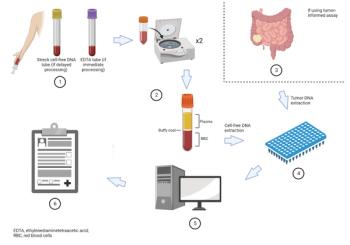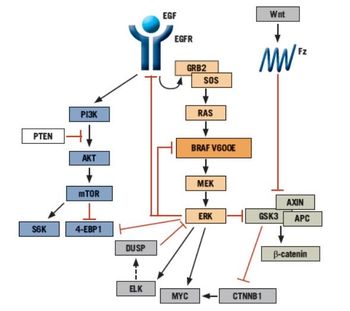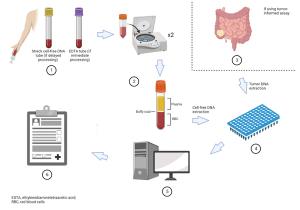
Ibrahim Halil Sahin, MD, and colleagues, explore, the CIRCULATE-US (NRG-GI008; NCT05174169) investigating postoperative ctDNA dynamics in early-stage colon cancer for treatment selection.

Your AI-Trained Oncology Knowledge Connection!


Ibrahim Halil Sahin, MD, and colleagues, explore, the CIRCULATE-US (NRG-GI008; NCT05174169) investigating postoperative ctDNA dynamics in early-stage colon cancer for treatment selection.

Ben Fangman, MD, and colleagues provide an overview of the use of circulating tumor DNA levels to detect minimal residual disease in colorectal cancer.

In this article, we review the characteristics of the BRAF mutation and the evolving strategies for managing BRAF-mutant metastatic colorectal cancer.

Cancer Network spoke with Dr. Scott Kopetz about RNA-based subtyping and the challenge of spreading the word of the importance of biomarker testing in colorectal cancer.

This video covers results of the SWOG 1406 study, which tested the BRAF inhibitor vemurafenib in combination with irinotecan and cetuximab for patients with metastatic, BRAF-mutant colorectal cancer.

Davies/Goldberg Article Reviewed. The complexity of treatment options that now exist for patients with newly diagnosed metastatic colorectal cancer has increased dramatically over the past decade.

Adjuvant therapy is defined as any treatment administered after surgical resection of a primary tumor with the intent of improving the patient’s outcome by eliminating any occult, viable tumor cells that may have remained after surgery.

Several developments in the past few years have incrementally progressedthe field and provided additional insights into the managementof advanced colorectal cancer. This review discusses the componentsof current cytotoxic chemotherapy regimens for advanced colorectalcancer: fluorouracil (5-FU), capecitabine (Xeloda), irinotecan(Camptosar), and oxaliplatin (Eloxatin). The equivalence of severalfront-line regimens has provided opportunities for increased tailoringof therapies for individual patients. Preliminary data onpharmacogenomics provides hope that we will be able to better matchpatients with regimens and doses on the basis of individualized predictionsof toxicity and response. The importance of second-line therapyin overall survival has again been highlighted; the best outcomes haveoccurred in patients treated with 5-FU, oxaliplatin, and irinotecan incombination with targeted therapies during the course of their disease.Elderly patients are no exception to this finding. Combination regimensand second-line therapy should be offered to elderly patients whohave adequate performance status and no contraindicated comorbidconditions, without regard for their chronological age.

Published: October 14th 2022 | Updated:

Published: October 13th 2022 | Updated:

Published: March 1st 2008 | Updated:

Published: November 18th 2008 | Updated:

Published: January 23rd 2017 | Updated:

Published: November 2nd 2005 | Updated: